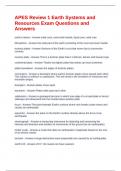-
1. Exam (elaborations) - Unit 4 earth systems (exam review) questions and answers
-
2. Exam (elaborations) - 5th elevate science topic 3 earth's systems exam questions and answers
-
3. Exam (elaborations) - 5th grade science unit test earth's systems exam questions and answers
-
4. Exam (elaborations) - Apes review 1 earth systems and resources exam questions and answers
-
5. Exam (elaborations) - Apes unit 4 earth systems exam review questions with verified answers
-
6. Exam (elaborations) - Chapter 12 earth systems exam questions and answers
-
7. Exam (elaborations) - Earth and environmental systems exam questions with correct answers
-
8. Exam (elaborations) - Earth science a - earth's systems exam questions with correct answers
-
9. Exam (elaborations) - Earth system exam 1 questions with correct answers
-
10. Exam (elaborations) - Earth system exam 2 questions with latest update
-
11. Exam (elaborations) - Earth system module exam questions and answers
-
12. Exam (elaborations) - Earth system science exam questions with verified answers
-
13. Exam (elaborations) - Earth system science study guide exam questions and answers
-
14. Exam (elaborations) - Earth system sciences exam 1 chapters 1 – 7 questions with correct answers
-
15. Exam (elaborations) - Earth systems- 5th grade exam questions and answers
-
16. Exam (elaborations) - Earth systems chapter 4 test exam questions and answers
-
17. Exam (elaborations) - Earth systems exam #2 questions with correct answers
-
18. Exam (elaborations) - Earth systems exam 1, 101 rutgers questions with correct answers
-
19. Exam (elaborations) - Earth systems exam 2 questions with complete solutions
-
20. Exam (elaborations) - Earth systems exam 3 questions with latest update
-
21. Exam (elaborations) - Earth systems exam 4 questions with correct answers
-
22. Exam (elaborations) - Earth systems exam study guide questions and answers
-
23. Exam (elaborations) - Earth systems practice exam test questions and answers
-
24. Exam (elaborations) - Earth systems quiz 1 exam questions and answers
-
25. Exam (elaborations) - Earth systems review exam questions and answers latest update
-
26. Exam (elaborations) - Earth systems science exam 1 questions with latest update
-
27. Exam (elaborations) - Earth systems test exam questions and answers
-
28. Exam (elaborations) - Earth systems test review exam questions and answers
-
29. Exam (elaborations) - Earth systems unit 1 exam study guide questions and answers
-
30. Exam (elaborations) - Earth's system test study guide questions and answers
-
31. Exam (elaborations) - Earth's systems interactions exam questions and answers
-
32. Exam (elaborations) - Earth's systems lessons 1&2 exam questions and answers
-
33. Exam (elaborations) - Earth's systems test exam questions with correct answers
-
34. Exam (elaborations) - Environmental science - unit 2 earth systems exam questions with correct answers
-
35. Exam (elaborations) - Geology & earth systems exam 1 (umd) questions and answers
-
36. Exam (elaborations) - Geology and earth systems final exam questions with latest update
-
37. Exam (elaborations) - Grade 5 science - earth systems exam questions with correct answers
-
38. Exam (elaborations) - History of earth systems exam 1 questions with correct answers
-
39. Exam (elaborations) - Interaction of organisms and earth's systems exam questions and answers
-
40. Exam (elaborations) - Introduction to earth systems science exam questions and answers
-
41. Exam (elaborations) - Lc2 exam review earth systems questions and answers
-
42. Exam (elaborations) - Leb 320f exam 2 questions and answers
-
43. Exam (elaborations) - Leb 320f final exam questions and answers latest update
-
44. Exam (elaborations) - Unit 5 earth's systems test exam questions with correct answers
-
45. Exam (elaborations) - Unit 3 exam earth system review questions and answers
-
46. Exam (elaborations) - Unit 2 earth systems exam questions and answers
-
47. Exam (elaborations) - Science unit 2, lesson 1 earth systems review exam questions and answers
-
Show more




